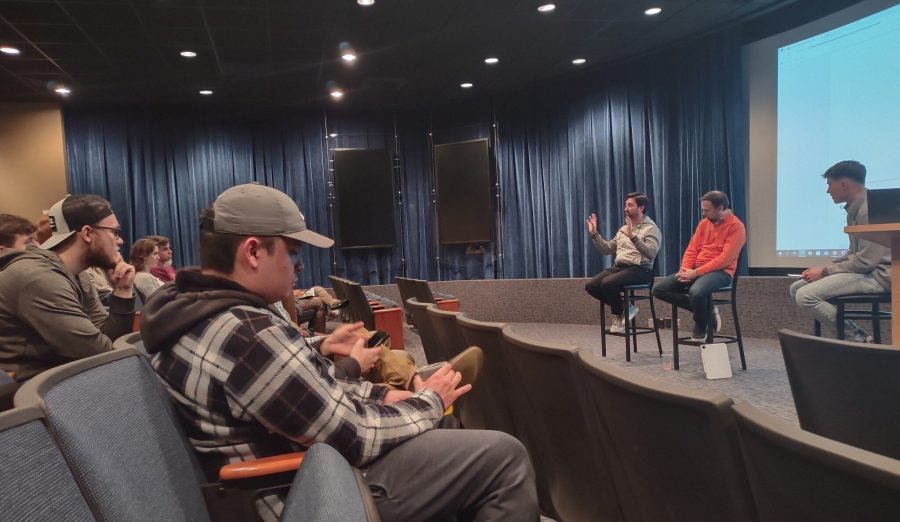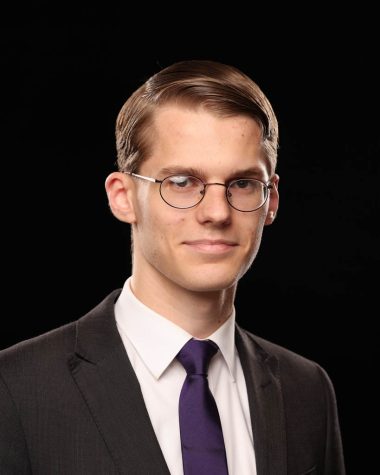Bob Jones University alumni answered student questions at an Entrepreneurship Network Advisor Panel on Tuesday, Jan. 31, in Levinson Hall. The speakers, Tim Joiner and Daniel Dye, are two of the alumni advisers who were invited to speak at all “ENet” events.
Tim Joiner holds three degrees from BJU, including a master of business administration completed in 2013. He is currently involved in several ventures, including real estate, shoe manufacturing and business coaching. He also supplies services such as barcoding and donations management to Goodwill stores.
Daniel Dye majored in business administration at BJU, like many of the students in the audience. He is the co-owner of GruffyGoat, a website development company. He is also involved with AI development and support.
David Bush, a senior double majoring in business and ministry, serves as a vice president of ENet and moderated the discussion. Bush first asked the panelists for productivity tips. Dye urged audience members to view time as their most precious resource. He also said that using different systems for your various ventures can create headaches and inefficiencies.
Joiner advised the students to cultivate an investor mindset, especially with time management, because of the power of compound interest. He recommended Calendly, a communication platform. He suggested automating, simplifying and organizing tasks, emphasizing the importance of having a robust organizational system that keeps everything in one place.
When the topic shifted to prioritization, Dye said that people should put first the tasks that are most clearly their responsibilities. He also encouraged the students to have a plan, keep their word and choose to focus on a single priority.
Pointing to the principle of opportunity cost, Joiner told the students to consider what they were willing to sacrifice to pursue a particular option or venture. “Every choice to do one thing is a choice not to do something else,” he said. He also warned the audience not to have their judgment clouded by “bright shiny objects” in the business world that seem new and exciting but may not deliver on promises.
Joiner observed that his theology motivates his industry, since working for the Lord is far better than simply working for oneself. He highlighted having ambitious goals, taking care of your health, and seeking clarity on exactly how one should want to make tomorrow better than today.
“I like my company because I built it,” Dye said. He enjoys the pros of being an entrepreneur, including being able to create the company values and culture. At the same time, he treasures what he termed oasis moments, times where he sets aside his work and does other things.
Dye highlighted the potential of services like ChatGPT to save innumerable hours on a wide range of tasks, revolutionizing productivity. He expects this new technology will generally increase the effectiveness of human workers rather than replacing them. Joiner anticipates AI becoming increasingly incorporated across industries, which could lead to substantial cost savings and even deflation.
Bush asked the panelists how they deal with the temptation to be greedy. Joiner said that balance comes from putting God first. Within that context, he said that entrepreneurship can create four kinds of freedom: freedom of time, purpose, relationships and money.
Dye said he has often been motivated simply to rise above his lower income background. Despite this challenge, he noted his many privileges he had no control over, including being born in America. He observed that although money is treated as a scoreboard, it does not solve all of a person’s problems.
The panelists recommended several resources, including the podcast Joiner runs with BJU alumnus Jeremiah Dew called “Grow with Tim.” Joiner recommended the books “The Power of Full Engagement,” “Good to Great” and “The Go-Giver.” Dye mentioned the podcasts “How I Built This” and “The Breakfast Club.”
Joiner said he usually spends the last hour of his day telling his kids stories, “snuggling,” and talking about their day. Dye said he typically spends that hour organizing his life for the next day.
ENet President Emily Hughes, a senior business major, has real-world experience with entrepreneurship. “I started a couple smaller things on my own and then launched a marketing company with another student that I met here at school. It’s called Driversified Marketing,” she said.
Hughes invited BJU students to check out the resources ENet offers and sign up for the annual Business as Mission conference in April by contacting her student email.






















































